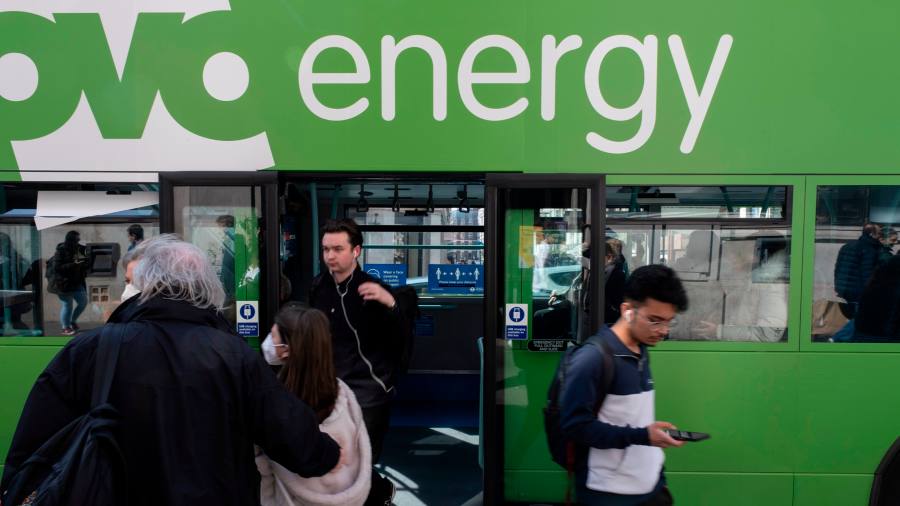
Ovo Energy, the UK supplier that has launched a last-minute bid to acquire collapsed rival Bulb from the government, was considered at risk of failure itself this summer, prompting regulator Ofgem to prepare for its potential nationalisation.
Plans were drawn up in July, according to two people close to Ofgem, with the company deemed financially vulnerable but “too big to fail” as a supplier to 4.5mn gas and electricity customers, or almost a sixth of all UK households.
Putting the company under state control would have been politically awkward for both the government and Ofgem following the collapse of dozens of suppliers last year.
Ofgem estimated that nationalising Ovo could have cost taxpayers and potentially bill payers £4bn, according to the people close to the regulator.
Fearing that a number of energy retailers were still at risk of collapse, Ofgem chose instead to provide additional support to the sector, introducing measures that increased charges for the typical household by roughly £400 a year — a move that stoked dispute within the regulator given that households were already being battered by spiralling energy costs.
“This deal has moral hazard written all over it,” said one person close to the regulator. “Suppliers should be able to ride out hard times, but Ofgem has introduced measures to protect them and consumers are paying the price.”
The £400 in additional charges, based on internal Ofgem estimates seen by the Financial Times, are for measures including a market stabilisation mechanism and one that shields suppliers from mismatches in the price of near-term power and gas and prices in the futures markets.
But when government support for energy bills — which limit costs for the typical home to £2,500 a year — ends in April the average household could face annual bills of more than £4,000, based on industry forecasts for the price cap.
In its 2021 accounts released last month, Ovo flagged that there was “significant doubt” over the “group’s and company’s ability to continue as a going concern”.
However, the company said in September that this was no longer the case because recent interventions by the government and the regulator had improved certainty. Ovo said on Friday that it was in “good financial health” and had “never been at risk of administration” in response to questions about the regulator’s nationalisation plan.
Ovo’s eleventh-hour bid for Bulb, which could bring it 1.4mn new customers, is likely to face enhanced scrutiny given its warning in last year’s accounts.
Executives at rival suppliers have told the FT that they were amazed by the emergence of Ovo’s bid for Bulb. It is unclear whether the government could accept a bid from Ovo since the sales process is already closed
Details of Ovo’s bid have not been revealed but Octopus Energy, the only other company to table an offer, has asked the government to lock in Bulb’s fuel purchases at a cost of about £1bn, although Octopus has said it will eventually repay this.
If Ovo is successful in acquiring Bulb it will provide energy to about a fifth of all UK households, rivalling British Gas as the largest supplier.
Andy Manning, economic regulation specialist at Citizens Advice, said households already reeling from a cost of living crisis were in effect being asked to provide financial support to the industry. Ofgem’s reputation was badly bruised after 29 energy suppliers collapsed last year as gas prices first soared.
“All these interventions mean that suppliers have been protected from an increase in systemic risk, generally at the expense of customers or taxpayers,” Manning said.
“Consumers cannot be asked to bear more risk on behalf of suppliers and also compensate suppliers for that risk.”
Ofgem declined to comment directly on the plan to nationalise Ovo or its decision to have customers fund additional support for the sector.
But the regulator said in a statement that it would “always plan for scenarios that will ultimately protect consumers, including the introduction of short-term interventions to help the market and benefit customers in avoiding higher costs from any future supplier failure”.
All households are already paying an additional £94 a year to reimburse suppliers such as British Gas-owner Centrica for taking on lossmaking customers from failed peers.
“With our conservative hedging policy we are well positioned for the winter ahead,” Ovo said on Friday.“ Along with other energy suppliers, we’ve worked hard to support the government to deliver a scheme which protects customers from the impact of global gas shortages on energy prices, and will continue to do so.”